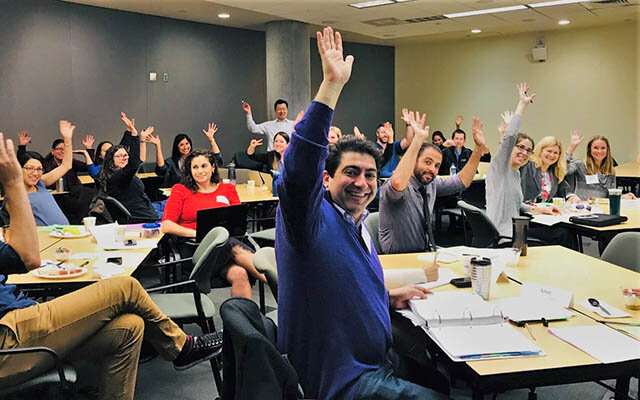#Faculty mentor training program strengthens university’s institutional climate

“#Faculty mentor training program strengthens university’s institutional climate”

Many universities are in search of strategies to improve their faculty diversity and institutional climate. One factor known to be critical for faculty satisfaction is proper mentorship, but many faculty, particularly women and those from underrepresented racial and ethnic backgrounds, lack clear access to high quality mentoring. To address this, the Office of Faculty Affairs at University of California San Diego Health Sciences developed a formal Faculty Mentor Training Program (FMTP), which they hope other universities will be inspired to replicate.
In a paper published online on December 23, 2021 in the Journal of Clinical and Translational Science, FMTP leadership detailed the program’s design and success in improving mentorship quality and faculty satisfaction, especially among underrepresented faculty.
“Our goal was to create an opportunity for all faculty to receive high quality and effective mentorship,” said study first author JoAnn Trejo, Ph.D., professor in the Department of Pharmacology at UC San Diego School of Medicine and assistant vice chancellor for UC San Diego Health Sciences Faculty Affairs. “This has never been done before in a health system-wide fashion, but now that we’ve developed and tested this approach, it can be applied to any medical school in the nation.”
Trejo and her colleagues set out to establish an evidence-based mentorship program that all faculty, including physicians, researchers and educators, would have access to. They especially hoped this would help address disparities in mentoring of women, LGBTQ and other underrepresented faculty.
Trejo says hiring diverse faculty is only the first step, but making them feel welcomed and a sense of belonging in the community is what really impacts their success.
“Good mentoring involves being able to connect with a person in an authentic way and trust that they have your best interest in mind,” said Trejo. “Those sorts of relationships may not be as easy to establish when there are cultural differences between the mentor and mentee. So if you leave mentorship to happen by chance, as we often do, underrepresented individuals find fewer opportunities to be mentored by senior faculty, and the quality of their mentorship is not as high.”
FMTP has now trained 23 percent of all Health Sciences faculty between 2017 and 2020, and shows no signs of slowing down. Senior faculty mentors receive training in effective communication, promoting work-life balance and addressing equity and inclusion, and later develop their own mentoring philosophy statements. Junior faculty mentees learn how to maximize their mentoring relationships and are encouraged to establish a career development plan. Senior and junior faculty are then matched within their departments based in part on clinical and research interests.
Following this three-year pilot of the program, data now reveal how the trainings have influenced the culture at UC San Diego Health Sciences. FMTP participants were significantly more satisfied with the quality of mentoring received compared to non-participants, with the greatest increase in satisfaction reported by underrepresented faculty (from 38 percent satisfied in 2017 to 61 percent in 2019). Underrepresented faculty also reported an improved morale and a greater sense that their environment was supportive for underrepresented faculty.
The surveys also suggested some areas for continued improvement. While senior faculty reported feeling more confident in their ability to mentor women, LGBTQ and underrepresented faculty, they were still not sure if they were meeting these mentees’ expectations. Future plans for FMTP now include additional sessions focused on culturally aware mentorship.
Since many of the mentoring skills taught by FMTP are universally applicable, Trejo believes it will continue to have impact not only on the faculty, but also on all of their mentees, including medical students, residents, fellows, graduate students and postdocs.
“We’re very excited about what we’ve learned and accomplished so far,” said Trejo. “I’m astounded by the unique ways each department has successfully implemented formal mentorship, and we look forward to helping the program grow and expand at UC San Diego Health Sciences and beyond.”
Co-authors include Deborah Wingard, Virginia Hazen, Alexandra Bortnick, Karen Van Hoesen and Vivian Reznik, all at UC San Diego, as well as Angela Byars-Winston and Christine Pfund at the University of Wisconsin, Madison.
Study: Peer mentorship is key to achieving equity in higher education leadership
JoAnn Trejo et al, A System-Wide Health Sciences Faculty Mentor Training Program Is Associated with Improved Effective Mentoring and Institutional Climate, Journal of Clinical and Translational Science (2021). DOI: 10.1017/cts.2021.883
Citation:
Faculty mentor training program strengthens university’s institutional climate (2022, January 11)
retrieved 12 January 2022
from https://phys.org/news/2022-01-faculty-university-climate.html
This document is subject to copyright. Apart from any fair dealing for the purpose of private study or research, no
part may be reproduced without the written permission. The content is provided for information purposes only.
If you liked the article, do not forget to share it with your friends. Follow us on Google News too, click on the star and choose us from your favorites.
For forums sites go to Forum.BuradaBiliyorum.Com
If you want to read more Like this articles, you can visit our Science category.




